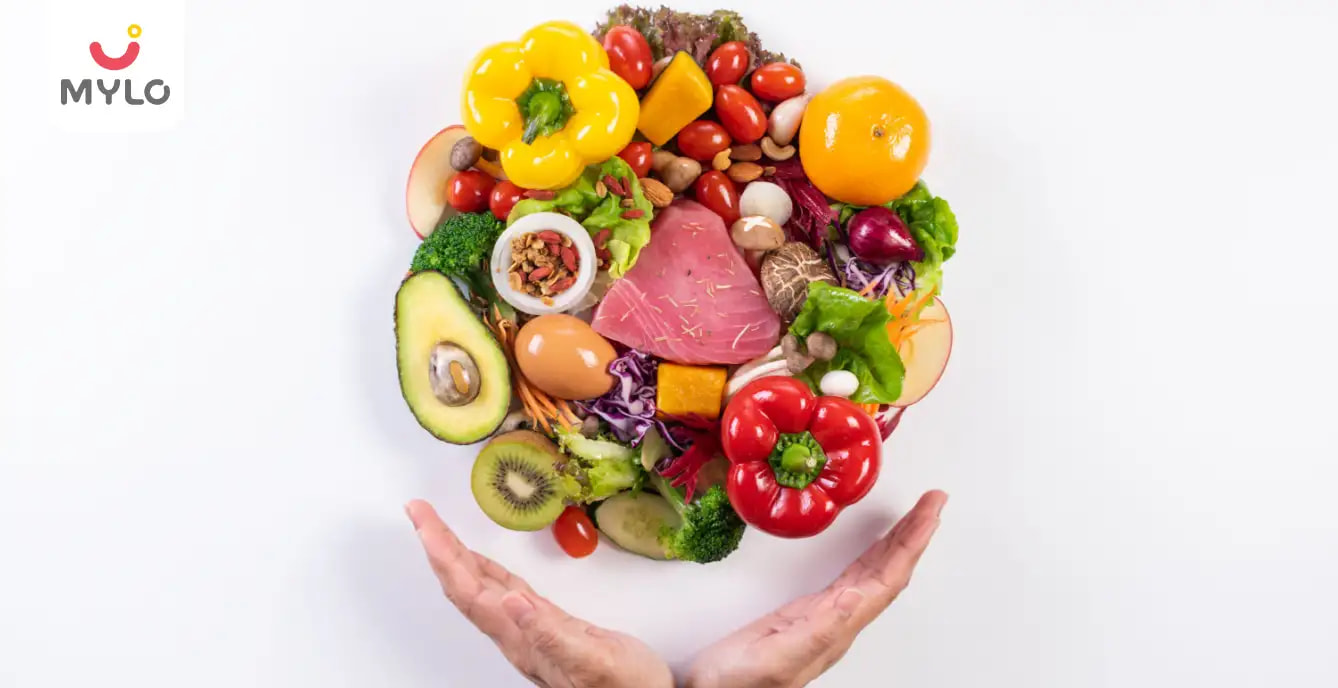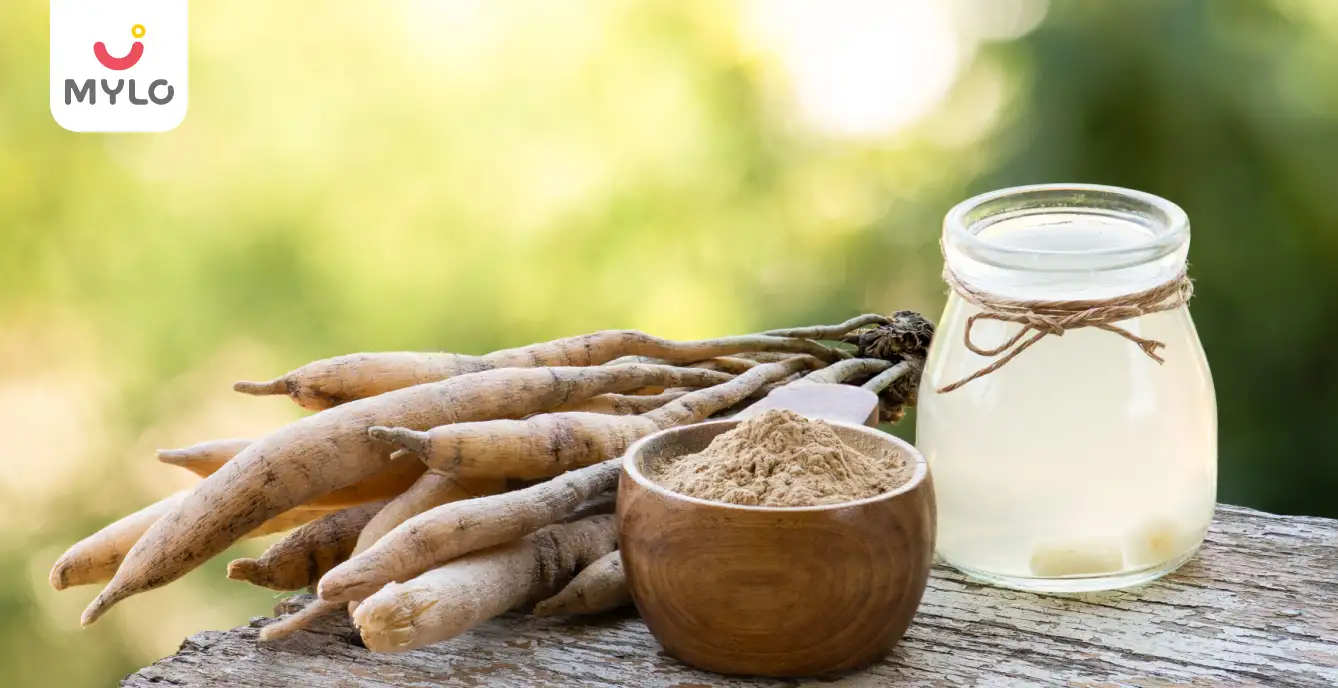Home

Diet Chart for Breastfeeding Mothers: The Ultimate Guide to Optimising Your & Your Baby's Nutrition
In this Article

Baby Care
Diet Chart for Breastfeeding Mothers: The Ultimate Guide to Optimising Your & Your Baby's Nutrition
Updated on 20 December 2024
With a tiny baby in your arms all your attention shifts to providing the best care and optimum nutrition to the little one. Breastfeeding is regarded as one of the most beautiful phases of motherhood where you can offer not only love and soulful connection, but also all the essential nutrients. As you scroll through the diet chart for breastfeeding mothers, you will gain useful insight regarding the breastfeeding diet chart, and also an Ayurvedic diet for breastfeeding mothers.
In this comprehensive guide you will find balance, joy, and well-being through delicious recipes and expert advice. With diet plan for breastfeeding mothers as your companion, fuel your journey with health, happiness, and the precious bond you share with your baby.
What are the Benefits of a Healthy Diet for Breastfeeding Mothers?
Maintaining nutrition and a proper breastfeeding diet chart offers numerous benefits for both the mother and her baby. Here are some key advantages of following a nutritious diet during this special phase:
1. Optimal nutrient supply
A healthy diet ensures that breastfeeding mothers receive a balanced intake of essential nutrients, including vitamins, minerals, proteins, and healthy fats. This supports the mother's overall health, promotes postpartum recovery, and helps replenish nutrient stores.
2. Increased milk production
Adequate nutrition is crucial for sustaining a healthy milk supply.
3. Enhanced quality of breast milk
A healthy diet positively influences the composition of breast milk, providing the baby with optimal nutrition. Nutrient-rich breast milk contributes to the baby's growth, immune system development, and overall well-being.
4. Healthy weight management
A balanced diet can aid in achieving and maintaining a healthy weight during breastfeeding.
5. Increased energy levels
Consuming a wholesome diet can help boost energy levels, combat fatigue, and support the demands of breastfeeding.
6. Postpartum recovery
A nutrient-rich diet supports the healing process after childbirth. Adequate protein, vitamins, and minerals assist in tissue repair, replenishing nutrient stores, and promoting overall recovery from childbirth.
7. Positive impact on maternal health
A healthy diet can contribute to the mother's long-term health, reducing the risk of chronic conditions such as heart disease, diabetes, and certain types of cancer.
Also read: Top 24 Foods to Increase Breast Milk Supply
Which Foods to Consume in a Diet Plan for Breastfeeding Mothers?
A nourishing diet chart for breastfeeding mothers in India can incorporate a range of traditional foods that are both healthy and culturally relatable. Here are some key food groups and examples of foods to include in a diet plan for Indian breastfeeding mothers:
1. Dals and Legumes
Consume a variety of dals (lentils) and legumes such as moong dal, toor dal, chana dal, and rajma. These are excellent sources of protein, fiber, and essential nutrients.
2. Whole Grains
Include whole grain staples like roti (whole wheat flatbread), brown rice, and whole wheat bread. These provide sustained energy and dietary fiber.
3. Dairy Products
Incorporate milk, yogurt, paneer (cottage cheese), and buttermilk. They are rich in calcium, protein, and other essential nutrients. Homemade ghee in moderation can also be included for its nutritional benefits.
4. Green Leafy Vegetables
Add nutrient-dense greens like spinach (palak), fenugreek leaves (methi), and amaranth leaves (chaulai). They provide iron, calcium, and other important vitamins.
5. Seasonal Fruits
Enjoy a variety of locally available fruits like mangoes, bananas, papayas, guavas, and pomegranates. They provide vitamins, minerals, and natural sugars for energy.
6. Nuts and Seeds
Include almonds, walnuts, cashews, flaxseeds, and sesame seeds. They offer healthy fats, protein, and essential minerals.
7. Homemade Soups and Stews
Prepare wholesome soups and stews using vegetables, lentils, and spices like turmeric, cumin, and ginger. These provide hydration, nutrients, and warmth.
8. Herbal Drinks
Traditional Indian drinks like jeera water (cumin water), ajwain water (carom seed water), and saunf water (fennel seed water) can aid digestion and hydration.
9. Spices and Herbs
Incorporate Indian spices and herbs like turmeric, cumin, coriander, fenugreek seeds, and curry leaves. They add flavor and offer potential health benefits.
10. Hydration
Drink ample water, coconut water, and homemade buttermilk (chaas) to stay hydrated and support milk production.
Which Foods to Avoid in a Diet Chart for Breastfeeding Mothers?
While it's important to focus on foods that are beneficial for breastfeeding mothers, there are certain foods that may be best to avoid or consume in moderation.
1. Spicy and Gas-Inducing Foods
Spicy foods, like chillies and strong spices, can sometimes cause gastric discomfort in both the mother and the baby. Gas-inducing foods like beans, cabbage, and cauliflower may also lead to digestive issues.
2. Caffeine
While a moderate amount of caffeine is generally considered safe, excessive consumption can lead to irritability, sleep disturbances, and even affect the baby's sleep patterns.
3. Certain Fish
Although fish is a valuable source of omega-3 fatty acids, it's important to be mindful of potential mercury contamination. Avoid high-mercury fish such as shark, swordfish, king mackerel, and tilefish, as they can be harmful to both you and your baby's health.
4. Alcohol
It is generally recommended to avoid alcohol while breastfeeding, as it can pass into breast milk and potentially harm your baby's developing system.
5. Highly Processed and Junk Foods
Opt for whole, unprocessed foods instead of highly processed snacks, sugary treats, and deep-fried foods. These foods lack nutritional value and can negatively impact your overall health.
Is it Beneficial to Follow an Ayurvedic Diet for Breastfeeding Mothers?
Following an Ayurvedic diet can be beneficial for breastfeeding mothers as it emphasizes holistic well-being and utilizes natural principles to promote health. Here are some benefits of incorporating Ayurvedic principles into the breastfeeding diet chart:
1. Balance and Nourishment
Ayurveda focuses on balancing the three doshas (vata, pitta, and kapha) to maintain overall health. A well-balanced Ayurvedic diet can provide the necessary nutrients, including proteins, carbohydrates, healthy fats, vitamins, and minerals, to support the mother's health and milk production.
2. Digestive Health
Ayurveda places significant importance on good digestion. Digestive-friendly foods, such as cooked vegetables, warm soups, and easily digestible grains, are typically recommended.
3. Herbal Support
Ayurveda incorporates the use of various herbs and spices that are believed to have beneficial properties. Certain herbs, such as fenugreek, shatavari, and fennel, are commonly used to support lactation and milk production in breastfeeding mothers.
4. Mind-Body Connection
Ayurveda recognizes the mind-body connection and the importance of mental well-being. The inclusion of stress-reducing practices, mindful eating, and relaxation techniques can positively impact the mother's overall health and milk supply.
5. Seasonal and Local Foods
Ayurveda emphasizes the consumption of seasonal and locally available foods. This promotes a connection with nature and ensures that the body receives fresh, nutrient-dense foods that are in harmony with the environment.
6. Individualized Approach
Ayurveda considers each person as unique, with specific dietary needs and constitution. A qualified Ayurvedic practitioner can provide personalized recommendations based on the mother's individual dosha, body type, and specific needs during the breastfeeding period.
How Long Should You Follow a Breastfeeding Diet Chart?
The duration for following a diet chart for breastfeeding mothers can vary from person to person. In general, it is recommended to maintain a healthy and balanced diet throughout the entire breastfeeding period, which typically lasts for at least the first six months of the baby's life.
During this time, your body requires additional nutrients to support milk production and to aid in postpartum recovery. Following a diet plan for breastfeeding mothers can help ensure that you are providing optimal nutrition for yourself and your baby.
To Sum-Up
Diet chart for breastfeeding mothers is an essential prerequisite towards healthy mother and healthy baby. Breastfeeding chart would help you pick only the best food items that not only maintain optimum nutrition but also help in increasing milk supply. The Ayurvedic diet for breastfeeding mothers strongly recommends including herbs like shatavari which helps in postpartum recovery and also enhances quality and quantity of breastmilk.
References
1. Ford, E. L., Underwood, M. A., & German, J. B. (2020). Helping Mom Help Baby: Nutrition-Based Support for the Mother-Infant Dyad During Lactation. Frontiers in Nutrition, 7.
2. Jouanne, M., Oddoux, S., Noël, A., & Voisin-Chiret, A. S. (2021). Nutrient Requirements during Pregnancy and Lactation. Nutrients, 13(2), 692.
.webp&w=1900&q=90)
Increase Breast Milk Supply with LactoMama ™ Lactation Granules - 300g - Pack of 2 | Elaichi
₹ 889

4.5
(20557)





Written by
Madhavi Gupta
Dr. Madhavi Gupta is an accomplished Ayurvedic doctor specializing in Medical content writing with an experience of over 10 years.
Read MoreGet baby's diet chart, and growth tips

Related Articles
Related Questions
Influenza and boostrix injection kisiko laga hai kya 8 month pregnancy me and q lagta hai ye plz reply me

Hai.... My last period was in feb 24. I tested in 40 th day morning 3:30 .. That is faint line .. I conculed mylo thz app also.... And I asked tha dr wait for 3 to 5 days ... Im also waiting ... Then I test today 4:15 test is sooooo faint ... And I feel in ma body no pregnancy symptoms. What can I do .

Baby kicks KB Marta hai Plz tell mi

PCOD kya hota hai

How to detect pcos

RECENTLY PUBLISHED ARTICLES
our most recent articles

Growth & Development
How Respiratory Syncytial Virus (RSV) Impacts Premature Babies Differently: What Every Parent Needs To Know

Health & Wellness
Unlocking the Hidden Potential: 8 Incredible Shatavari Powder Uses for Men and Women

Hormones
Are You Aware of These 11 Early Signs and Symptoms of Pregnancy?

General Father
Top 5 tips to build a budget-friendly nursery for your little one

Teething
Toddler Teething: What to Expect and How to Help

Early Education
Adverbs: A Comprehensive Guide to help small children learn the usage of adverbs
- Expand Your Child's Vocabulary with words that start with X: Easy, Positive, and Engaging Words, Animals, Countries, and Fruits
- Unlocking Language Proficiency: The Ultimate Guide to Top 100 Sight Words for Kindergarten and Beyond
- Exploring Common Words that Start with P to Enhance Vocabulary in Small Children
- 100+ Common Words that start with L to Enhance the Vocabulary of Small Children
- 100 Common Words that start with 'C' for Small Children
- List of 100+ Common Words that start with 'D' for Small Children
- 100 Common Words that start with 'S' for enhancing vocabulary in small children
- List of Most Common Words that start with v for small children
- Common Words that start with n for enhancing learning in small children
- Words that start with O for early learning in small kids
- 100 Common words that start with 'R' for Small Kids
- 100 Common words that start with 'U' for Small Kids
- Common words that start with Y for Vocabulary Enhancement in Small Children
- List of Common Q Words to Enhance Small Children's Vocabulary


AWARDS AND RECOGNITION

Mylo wins Forbes D2C Disruptor award

Mylo wins The Economic Times Promising Brands 2022
AS SEEN IN

- Mylo Care: Effective and science-backed personal care and wellness solutions for a joyful you.
- Mylo Baby: Science-backed, gentle and effective personal care & hygiene range for your little one.
- Mylo Community: Trusted and empathetic community of 10mn+ parents and experts.
Product Categories
baby carrier | baby soap | baby wipes | stretch marks cream | baby cream | baby shampoo | baby massage oil | baby hair oil | stretch marks oil | baby body wash | baby powder | baby lotion | diaper rash cream | newborn diapers | teether | baby kajal | baby diapers | cloth diapers |




